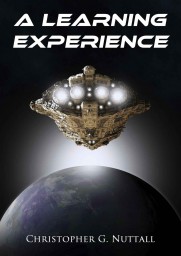REVIEW: A Learning Experience by Christopher G. Nuttall
Thursday , 10, July 2014 Book Review Leave a comment Second Amendment supporters, cyborgs, Star Trek references, Heinlein references, aliens that look like Skitters from Falling Skies, some serious action against Iran, a US president quoting Ayn Rand… Sometimes you need some suspended disbelief to enjoy a work of fiction, with books like this one you also need some sense of humor.
Second Amendment supporters, cyborgs, Star Trek references, Heinlein references, aliens that look like Skitters from Falling Skies, some serious action against Iran, a US president quoting Ayn Rand… Sometimes you need some suspended disbelief to enjoy a work of fiction, with books like this one you also need some sense of humor.
It all begins with the cliché of a group of friends in a remote forest being abducted by aliens. The aliens’ first problem is that they are using a spaceship that a much more advanced race built and they do not really understand much of its technology. Their second problem is that their victims are a group of former US Marines and a retired Navy SEAL. The humans manage to turn the tables as soon as they set foot on the mothership orbiting Earth.
The world the humans have just left behind is not particularly appealing to them. This is what had happened to a friend of theirs:
And then there’d been a riot – the food stamp system had broken down for several days – and Tony’s store had been robbed. Worse, he’d been threatened with arrest for attempting to defend his property with a shotgun and a bad attitude.
So what do you do if you live in today’s world—or one just very slightly worse—but you have a libertarian mindset and get a spaceship all for yourself and your No-Such-Thing-as-an-Ex-Marine buddies? Obviously, you found Heinlein Colony on the far side of the moon. Then, quietly, you start recruiting colonists from Earth; likeminded people with similar backgrounds.
For some reason, the colonists decide that they need a science-fiction writer so they approach one:
His work might not have won any Hugo Awards – they were delightfully politically incorrect – but they had a loyal fan base which grew larger every year. It had crossed Kevin’s mind that recruiting Glass might put a dampener on new novels, yet they needed someone with military experience and a libertarian bent.
The protagonists know that sooner or later more aliens will visit Earth looking for their lost friends. And they will not be pleased to find out that the primitive humans have commandeered their spaceship. Earth needs an anti-alien defense system soon. But the colonists cannot do it all by themselves and this will mean some sort of understanding with Washington and other governments.
To smooth relations with the American government, the colonists enter the war against Islamic terrorism in Afghanistan. So now they have no less than three fronts: a diplomatic effort to get along with Earth governments, particularly the US. A very one-sided war against terrorists in the Middle East. And the increasing threat of angry aliens from outer space.
And meanwhile, they have to build their new society. But this is no Galt’s Gulch. Nuttall doesn’t write radical politics. Actually, he wants to show us that, despite their well-meaning principles and fantastic technology, the colonists cannot build the utopian society of their libertarian dreams. That’s clearly the idea behind the title. The leader admits at least once that he cannot leave some people without healthcare because his wife (a Japanese doctor) would kill him. That sounds humoristic if you were expecting an Objectivist speech but it is certainly not all that unrealistic. There is even one case when one of the protagonists admits “I never thought I would be grateful for the bastards,” referring to the DHS.
However, the narrative transition from space battles—or Middle East battles—to domestic realpolitik is not always smooth. For example, there is one scene where the protagonists are confronted by a gang of aliens. The setting is typical of a Western gunfight. And when things are about to get real nasty, suddenly we cut to the next scene: a domestic violence trial back on the moon colony—very, very oddly anticlimactic.
A Learning Experience includes an afterword where Nuttall shares his thoughts about politics in the book and in today’s world. He also explains his writing process and reveals his ideas for possible sequels.
RATING: 7/10.
Please give us your valuable comment